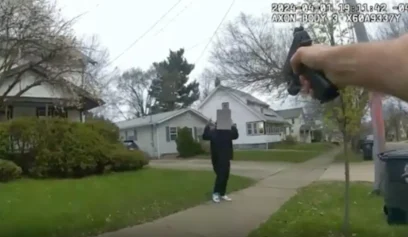
ADVANCE FOR STORY SLUGGED FRANCE ITALY MIGRANTS BY ELAINE GANLEY FOR RELEASE ON FRIDAY, JUNE 15, 2018. FILE – In this June 17, 2015 file picture migrants sleep on the rocky beach at the Franco-Italian border near Menton, southeastern France. Migrants who live through the trauma of camps in Libya, make the perilous Mediterranean crossing to Italy and try to push northward get a double-whammy at the French-Italian border. (AP Photo/Lionel Cironneau, File)
PARIS (AP) — Migrants who live through the trauma of camps in Libya, make the dangerous Mediterranean crossing to Italy and try to push north get a double-whammy at the French-Italian border, where many languish in a no man’s land without adequate food, water, shelter or basic rights, a leading rights group said Friday.
The report by Oxfam examines the plight of migrants at the border where the French and Italian Rivieras meet, a popular vacation destination for Europeans. For migrants, however, the Italian town of Ventimiglia is a place to escape from, only to face rough, often illegal, treatment by French police nearby.
The report comes amid a clash over migration between Italy and France and as French President Emmanuel Macron meets Friday with the prime minister of Italy’s new populist government, Giuseppe Conte.
The feud was triggered by Macron’s tough assessment of Italy’s decision to shut its ports to a rescue vessel loaded with 629 migrants — the French leader pointed at the Italian government’s “cynicism” and “irresponsible” behavior.
The Aquarius ship and two other boats are now heading to Spain after being stranded for days off the coast of Italy.
Italy shot back, however, with Conte’s office saying “Italy cannot accept hypocritical lessons from countries that on the topic of immigration have always preferred to turn their heads.”
Nearly 39,900 migrants were refused entry to France at the Italian border from January to August 2017, according to official data.
The Oxfam report says there were some 200 migrants in Ventimiglia in 2015, quoting an NGO director, Maurizio Marmo. The population then skyrocketed when France imposed border controls in 2015.
Today, there are an estimated 16,500 refugees and migrants in the town — one in four unaccompanied children. Volunteers counted 4,000 new arrivals in the first four months of 2018.
They live under a bridge near the border or in an official, overcrowded center where police stand guard and fingerprints are taken — removing their option to seek asylum outside of Italy.
Many migrants in Ventimiglia have been “pushed” out of Italy’s asylum system, which has failed to meet migrants’ basic needs, the report says. In a grim cycle, French border police in nearby Menton “push back” again, returning them to Italy, on foot or by train.
The report cites numerous examples of inhuman or illegal treatment by French police.
Fatima, 37, with a scarred face from a beating by Islamic State militants, fled Iraq with her mother, the report says. Caught by French police crossing the border, the two women were detained.
“We were not told anything. We were not given food or water,” the report quoted her as saying. Her elderly mother lay on the floor. They were trod upon.
“I had not been treated in that way by the police in my life,” Fatima told Oxfam.
Minors fair no better. French police often fail to honor European and French law for those under 18, according to the report. Youth cannot be sent back to Italy if they seek asylum in France. If they don’t want French asylum, they can only be returned after 24 hours and the appointment of an administrative guardian.
“These provisions and guarantees are time and again violated, as French officers put children immediately onto a regional train to Ventimiglia,” the report said.
Oxfam cited the case of 20 unaccompanied African youths returned to Italy — and a court decision this year in Nice that overruled France’s regional prefect who ordered them out.
The report also alleges some French police use tricks to force youth out of France, like changing birth dates on their papers so they won’t qualify for the special treatment of minors.
Tekle, a 16-year-old Eritrean, is cited as a case in point by Laura Martinelli, of the Association for Juridical Studies on Immigration. Forced off a train in Menton, he took pictures of the document with the birth date he declared — Oct. 1, 2001 — and of the police-issued “push-back document” with date of birth changed to Jan. 1, 2000.
“French police officers are not upholding international standards …. Besides pushing them back illegally, they taunt them and mistreat them,” said Chiara Romagno, project leader for Oxfam’s OpenEurope project.
Oxfam recommended that the French should “immediately stop and adequately sanction illegal practices” of police and ensure children’s asylum rights.
It said Italy should “significantly improve” asylum procedures and make them understandable to migrants, while Europe should redouble its commitment for nations to share responsibility in taking in asylum-seekers.


